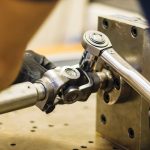Genetic sequencing: A new way of curbing malaria?
In an effort to curb the spread of malaria in sub-Saharan Africa, field trials using a specially developed mobile genetic sequencing kit have been successfully conducted by a team of British researchers
Using genetic-sequencing technology, a team of scientists from Oxford University recently spent two months in sub-Saharan Africa collecting data aimed at helping to curtail the spread of malaria in the region.
According to expedition leader Dr George Busby, the aim of the trip was two-fold. “First, we wanted to visit researchers and organisations along our African transect to document the work that’s currently been done to understand and control malaria.
“Second, we wanted to train colleagues in the use of a mobile genetic-sequencing kit and trial it in the field, so that we could assess the potential for its use as a tool for monitoring the malaria parasite and mosquito populations.”
With help of a bursary from vehicle manufacturer Jaguar Land Rover – which included use of a Land Rover Discovery, which had been converted by the company into a mobile laboratory – the team travelled nearly 7 000 km across Namibia, Zambia, Tanzania and Kenya in search of malaria-carrying mosquitos.
Busby says malaria parasites infect more than 200-million people every year, resulting in about 400 000 deaths – with about 90 percent of them occurring in sub-Saharan Africa. “Anti-malarial drugs have halved deaths since 2000, but now parasites that cause the disease are developing resistance to the medication.
“In order to control and eventually eliminate malaria, we need to better understand the distribution of parasites, and this requires innovative ways of monitoring mosquito populations and levels of both anti-malarial and insecticide resistance.”
Busby says DNA sequencing can provide up-to-date information about the drugs to which parasites are becoming impervious, since resistance is the result of mutations in the parasite genome.
Until now, genome sequencing of parasites has been confined to laboratories, but recent advances in mobile genetic-sequencing techniques mean that the technology can be taken into the field to provide vital information to malaria-control programmes at the front line.
“Genetic-sequencing technology has developed rapidly in recent years and its costs have reduced considerably,” Busby says. “The science has transformed from a labour-intensive, technical cottage industry used mainly by research scientists into a multi-billion-dollar enterprise. Genetic sequencing has become cheap, reliable and easy – and it’s permeating our lives; from tests for cancer susceptibility to direct-to-consumer ancestry testing, it is omnipresent.”
He says from a malaria perspective, genetic sequencing has great potential to help to monitor the disease’s transmission chains, as well offering insights into its resistance to treatment drugs.
“Over the last three years, the dramatic decreases in malaria witnessed over the previous 15 years have stalled. New innovations and approaches are needed if we are to continue to eliminate the disease in the next 20 years. Malaria remains a global issue that needs to be addressed.”
Genetic sequencing, he believes, will help to provide the answers. Driving the specially equipped Land Rover Discovery, the Mobile Malaria Project team – which included medic Dr Isaac Ghinai and expedition scientist Jason Hendry – travelled from Walvis Bay in Namibia through Zambia and Tanzania to Kilifi in Kenya, collaborating with a number of research centres working at the forefront of malaria eradication.
The team successfully completed the first trial of its mobile genetic-sequencing kit in Ndola, Zambia, managing to isolate four genes from samples provided by the country’s National Malaria Elimination Centre.
Busby says: “There was an enormous sense of relief, and a little bit of pride, that we were able to generate genetic-sequence data on parasite samples within three days of arriving at Ndola. We were honoured to have an opportunity to understand how malaria research works in Zambia and to demonstrate this new technology.”
After leaving Zambia, the team drove through Tanzania to get to its next stop in Kenya where it worked with the KEMRI Centre for Global Health Research. The team gained ethical approval to collect mosquitoes for sequencing, and successfully sequenced a full genome of 10 samples, allowing it to fully trial the feasibility of the mobile lab.
“It’s been quite a journey,” Busby says. “We’ve been met with nothing but positivity, intrigue and excitement. This has been an opportunity to experience the research world of scientists on the front-line of malaria research, and I think people have appreciated our attempts to show them new technology that is relevant to their work.
“I hope that anyone who has an idea to do something a bit different and to get out there and see the world will see that it is an eye-opening, refreshing and, ultimately, humbling learning experience.”
- The Land Rover Bursary has been run by the Royal Geographic Society on behalf of Jaguar Land Rover since 2007 and offers £30 000 (about R559 040) and the use of a vehicle to make a challenging journey that promotes a wider understanding or enjoyment of geography. Applications for the 2020 Bursary, which will be supported by the soon-to-be-launched Land Rover Defender, open on September 1. For information visit www.rgs.org/landroverbursary
Published by
Focus on Transport
focusmagsa




